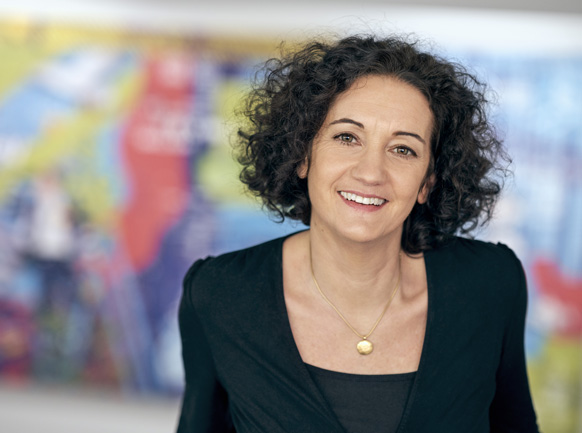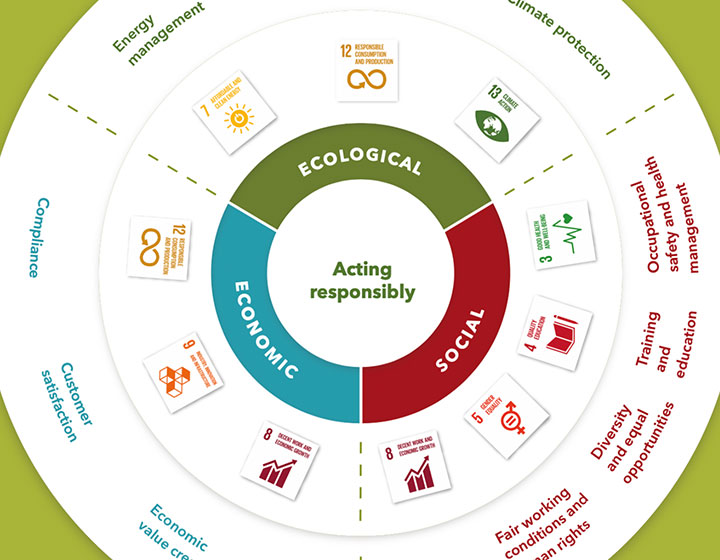A large poster hangs on the wall behind Yvonne Bonventre’s desk. It outlines the core points of BLG’s Mission Climate strategy for achieving climate neutrality. As a Team Leader in the area of sustainability, the graduate biologist is fully committed to the climate goal: By 2030, BLG plans to cut its own CO2 emissions – known as Scope 1 and 2 in climate science – by 30 percent compared to 2018, even if business volume increases. The company will offset its remaining emissions through certified climate protection projects. Furthermore, BLG has pledged to reduce emissions generated externally over the entire supply chain by 15 percent – that is Scope 3.
Prevention, reduction and offsetting
Yvonne Bonventre is aware that this is an ambitious target for a logistics service provider with an international network: “To achieve our goals, we need to make changes across the board. Our customers increasingly value sustainability. So our climate commitment gives us a competitive edge. That’s because customers can reduce emissions in their own supply chains as a result of our emission reductions and provision of climate-neutral services”.
Interim goals achieved
Yvonne Bonventre sums up the figures for the current CO2 balance sheet: “For our new absolute savings target, we need to reduce emissions by 2030 by an average of 2.5 percent per year. In the first year, we exceeded that goal by reaching a good three percent. The drop in the past year was 16 percent, but we can’t count that figure because of the exceptional situation due to the coronavirus. The lockdown at our customers in the automobile industry had a big impact on us in the early part of the year. However, our positive trend was definitely confirmed,” says the expert.
A series of actions taken by the company have contributed to this. In 2020, BLG was the first German logistics service provider to have its goals examined by the Science Based Targets initiative (SBTi) and to commit to recording, validating and publishing them. The company is tackling three major areas: “We’re continuing to increase our energy efficiency, trying to generate our own electricity from renewables as far as possible and also purchasing more electricity from green sources,” says Yvonne Bonventre. She points to her own workplace as an example of the first aspect. “Everybody knows you can save energy by cutting consumption or using more energy-efficient appliances.” BLG started the change process on a large scale years ago by appointing Energy Officers at more than 50 German locations and establishing an energy management system throughout the company. “This is how we promote sustainability throughout the whole company.”
Smart heating and lighting
The company requires lots of energy to heat its buildings. For example at one of the retail logistics location in Bremen, BLG replaced the heating control system and now saves 1.3 million kWh of gas per year. “Efficient control is one option, and choosing the right fuels is another major way we can reduce CO2 emissions,” says Yvonne Bonventre. “At the AutoTerminal Hamburg, we plan to replace the heating system and use biomass in the future. Obviously, that will massively improve our CO2 footprint,” says the sustainability expert.
All the buildings are being successively converted to LED lighting, and already this is saving the company some 2.4 million kWh of electricity per year. In the logistics center Bremen, three of the nine halls were converted to the new technology in 2020, and the rest will follow in 2021. The parking shelves and garages at the Autoterminal in Bremerhaven – the largest of its kind in Europe – are already illuminated by LED lighting. Here alone, the company saves 1.3 million kWh annually, which is equivalent to 400 tons of CO2.


